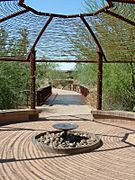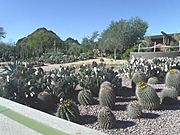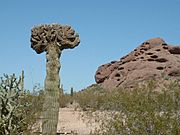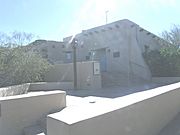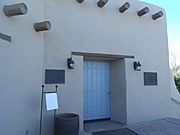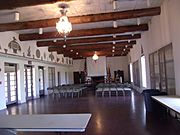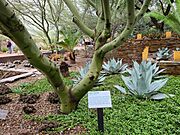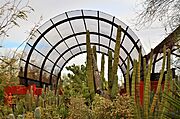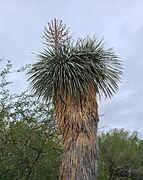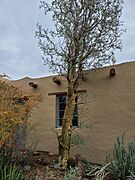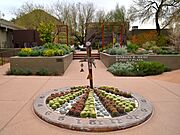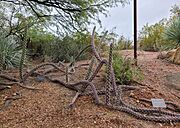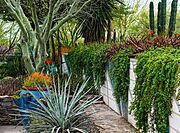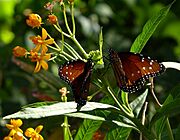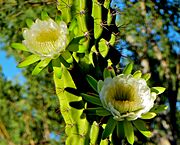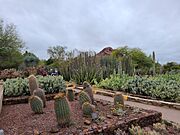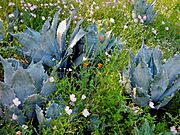Desert Botanical Garden facts for kids
Quick facts for kids Desert Botanical Garden |
|
|---|---|
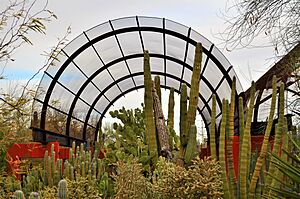
Desert Botanical Garden
|
|
| Lua error in Module:Location_map at line 420: attempt to index field 'wikibase' (a nil value). | |
| Location | Phoenix, Arizona, US |
| Area | 140 acres (57 ha) |
| Established | 1939 |
| Founder | Arizona Cactus and Native Flora Society |
| Habitats | |
| Plants | 50,000 |
| Species | 4,379 |
| Collections |
|
The Desert Botanical Garden is a special place in Phoenix, Arizona. It's a huge garden, about 140 acres big, located inside Papago Park. This garden is all about desert plants!
It was started in 1937 by a group called the Arizona Cactus and Native Flora Society. The garden officially opened its doors in 1939. Today, it has over 50,000 plants from more than 4,000 different types. A big part of these plants, about one-third, are native to the local area. This includes 379 types that are rare or in danger of disappearing.
The garden is famous for its amazing collections of agave and cacti. It has thousands of these plants! Some plants that need extra care are kept in special shaded areas. The garden also has plants from deserts around the world, like Australia, Baja California, and South America. You can see different desert environments here, like a mesquite forest or a semi-desert grassland. The Desert Botanical Garden is even known as a "Phoenix Point of Pride."
How the Garden Started
In the 1930s, some people in Arizona wanted to protect the desert. One of them was a botanist (a plant scientist) named Gustaf Starck. He put up a sign that said "Save the desert" to find others who felt the same way. In 1934, they formed the Arizona Cactus and Native Flora Society. Their goal was to create a garden that would help people understand and appreciate the unique deserts of the world, especially the local Sonoran Desert.
A woman named Gertrude Webster joined the group. She helped a lot with ideas and money to set up the garden in Papago Park. Another person, Margaret Bell Douglas, also helped by giving 1,500 plant samples to the garden's collection.
Gertrude Webster became the first president of the Society's board. In 1938, the board hired George Edmund Lindsay as the garden's first director. He helped with the first planting of plants on the grounds. The Desert Botanical Garden opened in 1939. It became a non-profit place focused on studying, teaching about, protecting, and showing off desert plants.
Fun Activities and Art
The Desert Botanical Garden offers many cool things to do. You can go on special tours to learn about desert plants and how to grow them. They also have workshops on nature art, photography, and even health and wellness.
The garden hosts outdoor concerts in the spring and fall. They also have art shows. A very popular event is "Las Noches de las Luminarias," which has been happening since 1978. This holiday tradition features live music and the beautiful glow of 8,000 hand-lit luminarias (small paper lanterns).
Gallery
- Desert Botanical Garden
-
A rare cristate Saguaro cactus
-
The Webster Auditorium building was constructed in 1939 and is located inside the compounds of the Desert Botanical Garden. In 1937, Gertrude Webster joined newly established Arizona Cactus and Native Flora Society. The auditorium is named after her. In 1990, the National Park Service certified Webster Auditorium as a national historic site and assigned it the reference number 9000823.
-
Parkinsonia microphylla at the Desert Botanical Garden
See also
 In Spanish: Jardín Botánico del Desierto para niños
In Spanish: Jardín Botánico del Desierto para niños
 | Percy Lavon Julian |
 | Katherine Johnson |
 | George Washington Carver |
 | Annie Easley |


